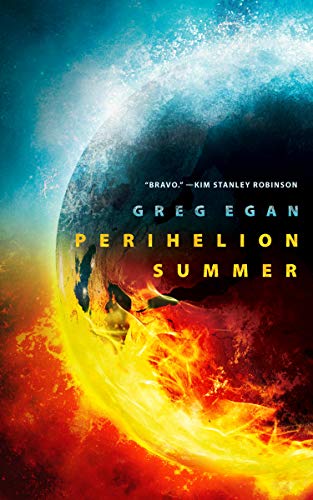Here's your light summer reading!
Cosmic catastrophe, in this case a close fly-by of a black hole Taraxippus, has long-term consequences for Earth's climate, and people on a rickety fish-farming ship try to survive and make the best use of it.
It's hard not to directly compare this to Neal Stephenson's SevenEves, which was terrible: That had ludicrously bad physics (hint: planets in collisions don't work like concrete hit by bullets, but more like water balloons), then ludicrously bad planning, then ludicrously bad genetics leading into full-on magical fairy tales. But what it also reminds me of is Neal Stephenson's Zodiac, an excellent book from back when he could write a tight story about science and then let an editor edit the manuscript.
Perihelion Summer, on the other hand, is written by someone who can do math and science. So the means of tracking the black hole makes sense, the physics of the catastrophe make sense.
It's also mercifully short, though that sometimes comes at a cost. The initial crew of the Mandjet (one of the ancient Egyptian names for the ship of the Sun) is small, but poorly described; and having both Arun and Aaron in the crew is a little confusing. Egan's never been strong at dialogue, does his characterization through actions and scientific discovery, which needs more page count. The action moves forward in time rapidly, letting us deal with the consequences now rather than in hundreds of pages.
Matt said, “Let me start by saying that if we end up in prison, I promise to install ceiling insulation and double glazing in all of your cells.”
The coming apocalypse and the migrations necessary to survive, are what this is all about. Part of this is Egan's perspective in the Southern hemisphere, which already has a terrible temperature gradient and Australia's genocidal immigration policies; if that gets worse, billions die. And not entirely off-page like so many other catastrophe books.
“But however vast the fleet, however crowded the decks and holds of every fleeing vessel, they would always be outnumbered by the ones they’d left behind.”
The American solution to some of the problems isn't the Southern solution, which changes the tone quite a few times.
The ending's a bit abrupt. I'm still very pleased with it.
★★★★★
